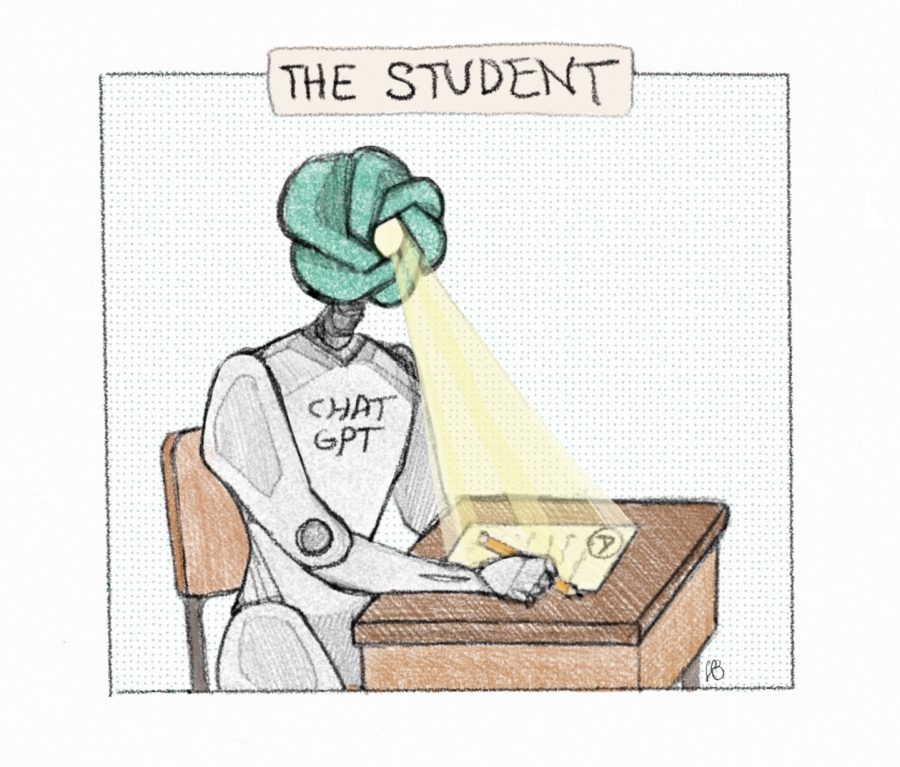Illustration done by Heide Brazier.
ChatGPT: Menace or Tool?
March 15, 2023
“The Glen Bard is proud to present the remarkable technology of ChatGPT, an innovative artificial intelligence language model developed by OpenAI. This cutting-edge tool is designed to understand and respond to natural language input, making it a versatile and powerful resource for students and educators alike. Whether you’re seeking information, entertainment, or just a friendly conversation, ChatGPT is equipped to provide human-like responses to a wide range of prompts. With advanced machine learning algorithms and an ability to analyze vast amounts of data, ChatGPT is changing the way we interact with technology. As it continues to evolve and improve, ChatGPT promises to be a major player in the world of artificial intelligence, and a valuable resource for anyone seeking answers or engaging conversation.”
The above excerpt is a response from ChatGPT, an artificial intelligence, or AI chatbot that has taken the world by storm. What is artificial intelligence, one may ask? Artificial intelligence (AI) involves using computers to do things that traditionally require human intelligence.
AI can process large amounts of data in ways that humans cannot. The goal for AI is to be able to do things like recognize patterns, make decisions, and judge or even think and respond to things the way humans usually do. It’s as simple as asking a question, and the chatbot will formulate a response exactly catered to your needs.
You can even go as far as to mention a word count, include cited sources, and ask it to write an essay for you. As one can imagine, this is both fascinating as well as horrifying, as an AI can now create pieces of writing that may seem like they were written by an actual person.
As an AI language model, ChatGPT has proven to be a remarkable advancement in technology and the “beginning of the future,” as some may say. But despite its benefits, which will be later discussed, there are some implications that are worth considering. One of the most significant cons of ChatGPT is the potential for bias in its responses. The model is only as good as the data it is trained on, and if the data contains biases, then ChatGPT’s responses will be biased as well.
Even though the creators of ChatGPT have tried to address this issue by incorporating diverse datasets, it is still possible for the model to perpetuate harmful stereotypes or discriminatory language, as it ultimately derives all information from the internet.
Another issue with ChatGPT is the potential for misuse or abuse. ChatGPT can be programmed to generate text in any style or tone, which means that it could be used for malicious purposes, such as generating fake news or spreading propaganda. The model could be trained to imitate specific individuals, which could be used for impersonation, cyber bullying, or identity theft.
This is one of the main reasons that New York City schools have banned the use of ChatGPT amid fears of cheating in essay writing, going so far as to blocking students from accessing the website from school wifi.
Another drawback of ChatGPT is the lack of emotional intelligence. While the model can generate text that is certainly grammatically correct and coherent, it lacks the ability to understand emotions or context. This can lead to ChatGPT providing inappropriate or insensitive responses in certain situations, which could be perceived as harmful or offensive.
The blatant overreliance on technology can be detrimental to human communication skills. As ChatGPT becomes more prevalent, people may become more reliant on it for communication and formal writing, leading to a decline in social skills, reading proficiency, and the ability to communicate effectively in person.
Although ChatGPT has many schools worried about the potential for academic dishonesty and cheating, it doesn’t have to be just that. ChatGPT can provide so much more than just an essay to a prompt. It can be used as a useful tool to provide quick and accurate responses to inquiries, or in education to answer questions and provide explanations for complex concepts, making it a useful tool to help in understanding and grasping harder subjects.
Another thing ChatGPT can help with is translation. The AI model can be used to translate text from one language to another. This can be useful for individuals or businesses that need to communicate with people who speak a different language.
It can also be utilized as a tool for research, by analyzing large amounts of text data and identifying patterns or trends. Overall, ChatGPT can be used in a variety of different ways that can be very beneficial and shouldn’t necessarily be looked at solely with a negative connotation.
